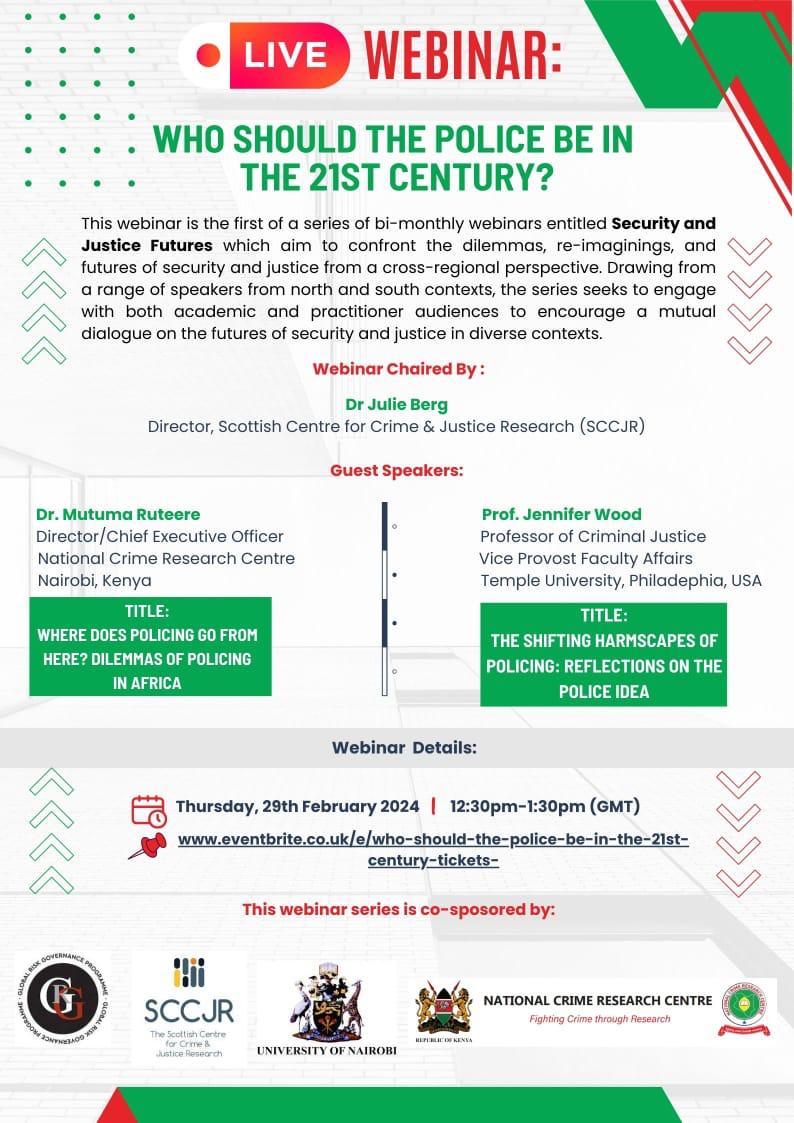Online Seminar on "Who should the police be in the 21st Century?"
Description:
This webinar is the first of a series of bi-monthly webinars entitled Security and Justice Futures which aim to confront the dilemmas, re-imaginings and futures of security and justice from a cross-regional perspective. Drawing from a range of speakers from north and south contexts, the series seeks to engage with both academic and practitioner audiences to encourage a mutual dialogue on the futures of security and justice in diverse contexts.
The focus of this first webinar, chaired by Dr Julie Berg, Director of SCCJR, will include talks from Dr Mutuma Ruteere and Professor Jennifer Wood, who consider the challenges and future directions of the police/policing in diverse contexts faced with new and emerging harmscapes.
Speaker: Dr Mutuma Ruteere
Title: Where Does Policing Go From Here? Dilemmas of Policing in Africa
Abstract: Policing in Africa enters the second decade of the 21st Century searching for the mediation of critical dilemmas both in its theory and practice. Over the years, most of the academic and policy work in Africa has paid considerable attention to issues of reforms and transformation of public police; offered critiques of their performance deficits; and highlighted their accountability gaps, and disconnect from the public. At the policy level, a lot of work has also gone into technical reforms and the search for public policing models mostly along the Peelian ideal. Today, there is a sense of policy fatigue in the reform enterprise and even possibly an intellectual pessimism on the prospects of transformation of public policing in Africa. Socio-political and economic uncertainties and rapid technological shifts have added to the complexities and perplexities facing the policy and academic community interested in policing in Africa.
Three critical dilemmas call for both theoretical and policy reflection:
First and probably most critically – is where to find new ideas about policing. For most African countries there are few or no institutions dedicated to the search for new ideas and frameworks for policing. African policing continues to be afflicted by thin theorization. A preponderance of the scholarship is focused on technical aspects of policing with very limited focus on foundational issues. In policy practice, policing is often taken as a given and routine practices trump reflection. Partly, for that reason, policing in many instances remains rooted in outdated logics and practices. In most cases, also, academic research on policing remains peripheral to policy making and practice. The key question then, is who is thinking about policing in Africa in the 21st century? Where should that thinking and reflection be located?
Second, is what the shift in the nature governance means for policing in Africa? Internally and externally, the African nation-state is undergoing important changes in its governance. There is increased plurality of actors in security; shifts in the conceptualization of sovereignty; increased population mobility and a redefinition of borders.
Third, what will the technological revolution mean for African policing? If the industrial revolution in Europe defined modern policing, how will policing change and transform in the 4th Industrial Revolution for Africa? Given the current landscape of data in Africa what will innovations such as Artificial Intelligence mean for policing?
Bio: Dr Mutuma Ruteere is the Director/CEO, National Crime Research Centre, Kenya’s state agency on crime research. Previously, he served as founding Director, Centre for Human Rights and Policy Studies, based in Kenya. He has served as a member of the Presidential Task Force on Police, Prisons and National Youth Service Reforms in Kenya (2022-2023). He has also served as the United Nations Special Rapporteur on Racism, Racial Discrimination, Xenophobia, and Related Intolerance (2011-2017).
Speaker: Professor Jennifer Wood
Title: The Shifting Harmscapes of Policing: Reflections on the Police Idea
Abstract: This presentation examines the policing function in relation to shifting landscapes of harm, and reflects on the idea and mandate of the police in response to these shifts. Policing systems have long functioned as health intervention systems, responding to harms such as violence, substance misuse, and mental distress. These harms are connected to and exacerbated by the meta-harmscape of climate change. Given the growing interconnectedness of health harms and climate harms, this stresses the critical need for a 'consciousness of interconnection' in advancing policing for the future. In giving life to this consciousness, the presentation puts forward the idea of police as 'regenerative' agents, helping to stimulate the interconnected growth of systems that promote human and planetary health.
Bio: Jennifer Wood is a Professor of Criminal Justice and Vice Provost for Faculty Affairs at Temple University in Philadelphia, USA. She earned a bachelor’s degree in Criminology at the University of Ottawa and received both an M.A. and Ph.D. in Criminology from the University of Toronto. Jennifer is a criminologist with expertise in policing and regulation. Her research focuses on the many intersections between policing and public health, including changes in how officers intervene with people experiencing health vulnerabilities such as mental illness. Jennifer is the North American Editor for Policing and Society: An International Journal of Research and Policy.


